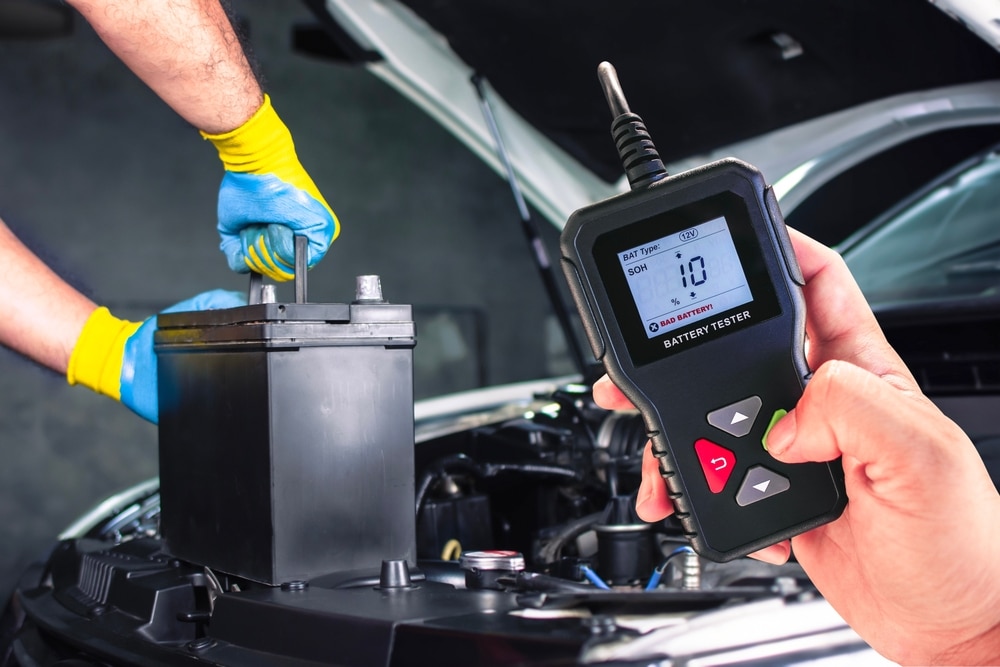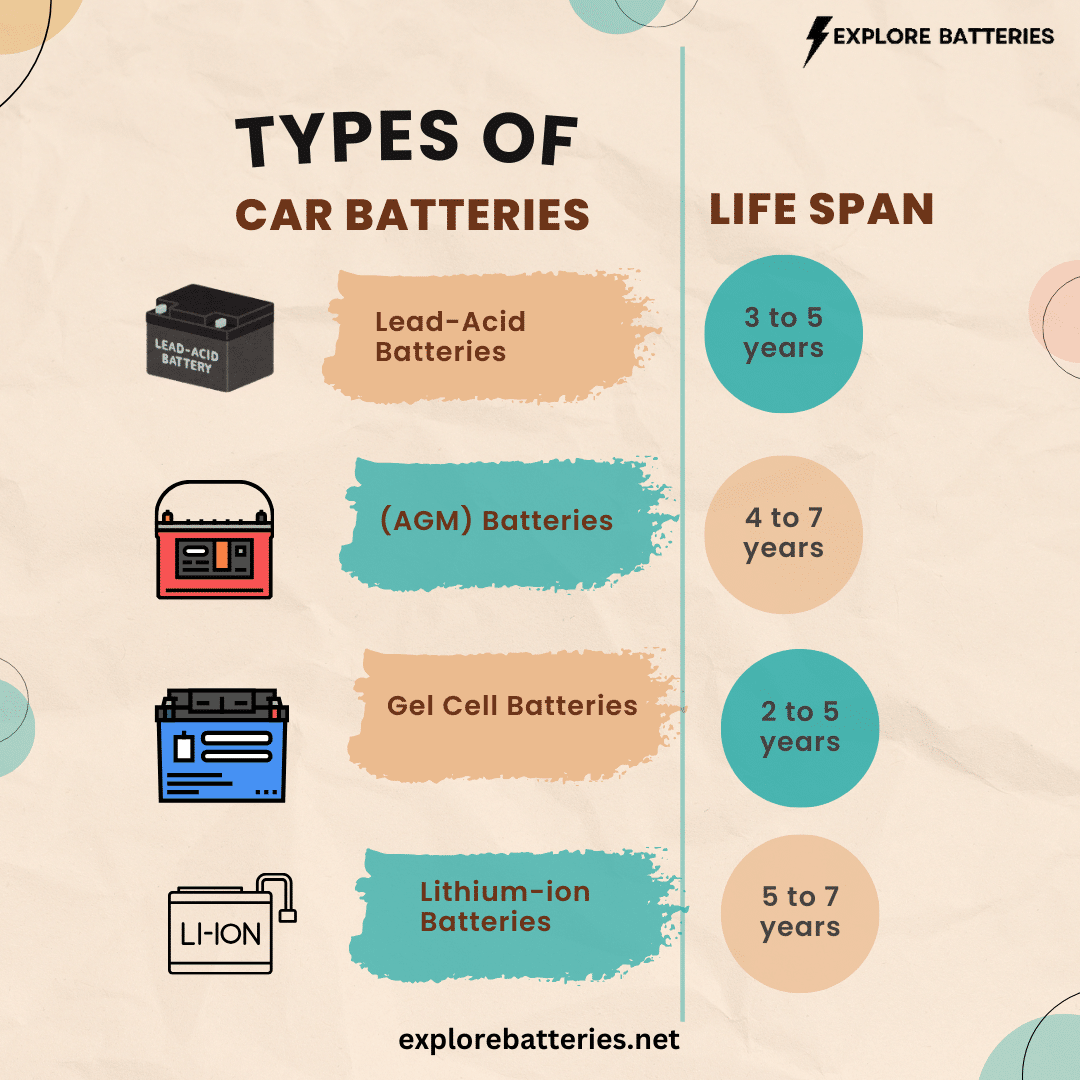Table of Contents
What is the ultimate zap needed for your car to start and give impressive performance? Well, without having any second thought, it’s the Car battery, the unsung hero needed for optimal performance. Apart from providing the fuel needed for the engine to start the car, it also keeps the car moving without any interruption. Moreover, it also performs several electrical operations, such as charging your phone while you are traveling. Now, you must be thinking, what is the ideal car battery, and how long does a car battery last? Don’t worry we have got you covered. This guide will discuss the lifespan of car batteries and some of the maintenance tips to follow. So, get ready to extend the lifespan of your car battery.
Factors Impacting Car Battery Lifespan

Folks, if you own a car and wonder how long a car battery usually lasts, we are here to help you with this. Although the lifespan varies greatly depending on the car model and different car batteries, the factors remain the same. Let’s have a look at factors determining how long a typical car battery lasts.
1. Climate
- High Temperatures: Cold weather can hinder chemical reactions, lowering the battery’s efficiency. In extremely cold weather, the electrolyte could freeze, and the battery wouldn’t be able to function properly. This is one of the most important factors in answering how long a battery car lasts.
- Low Temperatures: Cold weather can have negative consequences in addition to speeding up chemical reactions within the battery, which causes it to deteriorate more quickly. The more degraded the battery, the less the car battery lasts on average.
2. Driving Habits
- Short Trips: Although short trips don’t give the alternator enough time to fully recharge the battery after starting the engine, which causes the battery’s charge to gradually drain, long highway drives give the alternator enough time to do so.
- Continuous Starts: The battery experiences a brief, high load each time you start your car, which can put a strain on it, particularly if the engine stops working for a long period. So, in short, a car battery does last longer without driving. Your driving habits impact the car battery a lot more than any other factor.
3. Age and Condition of the Vehicle
-
- Older Vehicles: Older cars have less effective charging systems than more recent models, which results in insufficient battery charging. Corrosion and loose connections can also obstruct the flow of electricity, making the battery work harder and shortening its lifespan.
Frankly, it is so simple to understand: when your vehicle gets older, so does the battery. It is one of the answers to how long a battery lasts in a car.
4. Usage Frequency
- Accessories: When we discuss how long a Tesla car battery, a hybrid car battery, or any other usage is important to discuss. Aftermarket accessories that consume power from the battery, particularly when the engine is not running, such as powerful sound systems or extra lighting, can accelerate battery depletion if they are not fully recharged.
- The battery’s lifespan can be shortened by corrosion buildup, electrolyte loss, and other problems if normal maintenance activities, such as cleaning the battery terminals, checking fluid levels, and making sure appropriate connections are neglected.
Types of Car Batteries and Lifespan

1. Lead- Acid Batteries
Duration: Usually last for three to five years.
- Description: The most prevalent kind of batteries used in automobiles are lead-acid batteries. They include lead plates covered in a sulfuric acid and water electrolyte solution.
2. Absorbent Glass Mat (AGM) Batteries
Lifespan: Approximately 4 to 7 years of battery life.
- Description: Glass mat separators in AGM batteries provide for a spill-proof construction by absorbing the electrolyte. They are renowned for being sturdy and vibration-resistant. Now, you know how long a new car battery lasts.
3. Gel Cell Batteries
Lifespan: Usually lasts for two to five years.
- Description: Gel cell batteries have a gel electrolyte rather than a liquid electrolyte, which increases their resistance to spills and vibration. Applications involving deep cycles frequently employ them.
4. Lithium-ion Batteries
Lifespan: The lifespan of lithium-ion batteries is approximately 5 to 7 years.
- Description: Because of their high energy density and reduced weight, Lithium-ion batteries are gaining traction. Classic lead-acid batteries offer faster charging times and longer lifespans. Let me tell you that electric cars use lithium-ion batteries, so if you are thinking about how long do they last, it is usually 5-7 years.
Maintenance Tips for Prolonging Battery Life

1. Regular Inspections
- Visual Checks: Check the battery for physical damage, leaks, or corrosion.
- Clean Terminals: To remove corrosion from the battery terminals and cable connections, use a solution of baking soda and water.
2. Keep it Charged
- Use a Maintainer: If the car will be parked for a long time, think about keeping the battery charged with a battery maintainer.
- Disconnect: As an alternative, to stop parasitic draining, disconnect the negative terminal.
3. Avoid Short Excursions
To enable the battery to fully recharge, combine short excursions into longer ones whenever you can.
4. Test the Charging System
Make sure that the alternator and voltage regulator are correctly charging the battery by testing them on a regular basis.
5. Limited Accessory Use
To lessen the burden on the battery, make use of accessories as little as possible when the engine is not operating
6. Protect against Extreme Temperatures
You can also minimize exposure to heat by parking the car in a garage or other covered place during hot weather. In order to help maintain ideal operating temperatures in cold climates, look into using a battery insulation kit.
7. Select the Correct Battery
Invest in a premium battery that fits the requirements and climate of your car.
8. Follow Manufacturer Guidelines
Last but not least, guarantee optimum performance and lifespan and follow the manufacturer’s recommendations for battery maintenance and replacement intervals.
By being aware of these aspects, selecting the best battery, and carrying out routine maintenance, you can extend the life of your car battery and reduce the chance of unplanned breakdowns.
You can also check the signs of battery wear and tear in Michael’s article.
Conclusion
Wrapping up, the article covered details on the lifespan of a car battery. If you are a car owner and are worried about the battery, have a look at our article and get expert insights.

